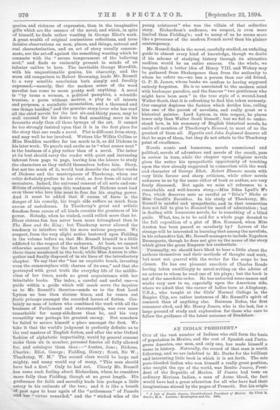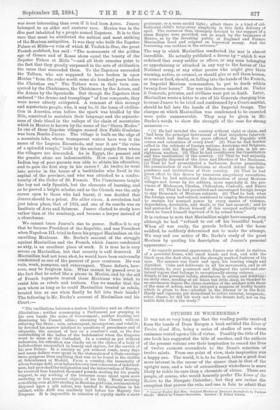AN INDIAN PRESIDENT.*
Our of the vast number of Indians who still form the basis of population in Mexico, and the rest of Spanish and Portu- guese America, one man, and only one, has made himself a name in history. Naturally, the record of that man is worth following, and we are indebted to Mr. Burke for the brilliant and interesting little book in which it is set forth. The sole pure-blooded Indian who won himself a really great position, who caught the eye of the world, was Benito Juarez, Presi- dent of the Republic of Mexico. If Juarez had been an ordinary Mexican Indian, a man of Aztec blood, the fact would have had a great attraction for all who have had their imaginations stirred by the pages of Prescott. But his origin * A Life of Benito Juarez, Constitutional Proficient of Mexico. By Mak R. Burke, M.A. London; Remington and Co. 1894. was more interesting than even if it had been Aztec. Juarez belonged to an older and ansterer race. Mexico was in the dim past inhabited by a people named Zapotecs. It is to this race that must be attributed the noblest and most striking of the Mexican antiquities. It was they who built the Zapotec Palace at Mitla—a ruin of which M. Viollet-le-Duc, the great French architect, has said : " The monuments of the golden age of Greece and of Rome alone equal the beauty of the .Zapotec Palace at Mitla "—and all their remains point to the fact that they greatly surpassed in the arts of civilisation the races that succeeded them. To the Zapotecs succeeded the Toltecs, who are supposed to have broken in upon Mexico "from the ruder north some six hundred years before the Christian era." The Toltecs were in their turn con- quered by the Chiohimecs, the Chiohimeos by the Aztecs, and the Aztecs by the Spaniards. But though the Zapotecs thus endured " the drums and tramplings " of four conquests, they were never utterly extirpated. A remnant of this strange and mysterious people, who, it may be, lit the lamp of civilisa- tion in America, even before the spark was kindled by the Nile, contrived to maintain their language and the separate- ness of their blood in the valleys of the chain of mountains which in Mexico is known by the name of the" Sierra Madre." In one of these Zapotec villages named San Pablo Gaelatao was born Benito Juarez. The village is built on the edge of a. mountain lake, whose transparent waters have won it the name of the Laguna Encantada, and near it are " the ruins of a splendid temple," built by the ancient people from whom the villagers are descended. As in Egypt, the peasant and the granite alone are indestructible. How came it that an Indian boy of poor parents was able to obtain his education, .and to gain the first step in his career P At twelve he went into service in the house of a bookbinder who lived in the capital of the province, and who was attached to a confra- ternity of the Order of St. Francis. The Franciscans taught the boy not only Spanish, but the elements of learning, and as he proved a bright scholar, and as the Church was the only -career open to those who had learnt, it was decided that Juarez should be a priest. Die aliter visum. A revolution had just taken place, that of 1824, and one of its results was an Institute of Arts and Sciences. Juarez elected to study here rather than at the seminary, and became a lawyer instead of a. churchman.
We cannot trace Juarez's rise to power. Suffice it to say that he became President of the Republic, and was President when Napoleon III. tried to force his puppet Maximilian on the unwilling Mexicans. Mr. Burke's account of the struggle against Maximilian and the French, which Juarez conducted so ably, is an excellent piece of work. It is true he is very severe on Maximilian, but that severity is well deserved. If Maximilian had not been shot, he would have been universally -condemned as one of the poorest of poor creatures. He was vain, weak, pompous, and extravagant. These defects, how- ever, may be forgiven him. What cannot be passed over is the fact that he acted like a pirate in Mexico, and by the aid of French bayonets treated those Mexicans who tried to resist him as rebels and traitors. Can we wonder that the men whom as long as he could Maximilian treated as rebels, treated him as one when finally he fell into their hands ? The following is Mr. Burke's account of Maximilian and his Court :- " His vacillations between a useless Liberalism and an offensive Absolutism ; neither summoning a Parliament nor grasping in his own lands the reins of Government ; neither trusting nor dismissing his French allies ; alarming the Church without relieving the State ; vain, extravagant, incompetent, and volatile ; he devoted his narrow intellect to questions of precedence and of etiquette, the amount of lace on a courtier's coat, or the due marshalling of the ladies of the bedchamber when the Empress went to mass at the Cathedral. In a country as yet without industries, his attention was chiefly set on the choice of a body of hallebardiers unequalled in beauty and stature, for the service of his new Palace. In a country as yet without roads, many days and many dollars were spent in the elaboration of a State carriage more gorgeous than anything that was to be found in the stables at Schonbrunn or Madrid. Prom a country, the immensity of whose foreign debt, even before his own vast concession of indebted- ness, had provoked the indignation and the intervention of Europe, he received four hundred thousand pounds sterling for his yearly support, to say nothing of the immense sums spent upon more enduring or less personal objects of his folly. Every morning something over £1,000 sterling in Mexican gold coin, ceremoniously disposed upon a gilt salver, was handed to Maximilian in his cabinet, while £100 was similarly laid before her Majesty the Empress. It is impossible to conceive of royalty under a more grotesque, or a more sordid light ; albeit there is a kind of old- fashioned child's fairy-story simplicity in this daily delivery of spoil. The resources thus strangely devoted to the support of a sham. Empire were provided, not so much by the taxpayers of Mexico, as by the investing public of England and France. Maximilian lived and reigned on borrowed money. And the borrowing was reckless in the extreme."
The way in which Maximilian conducted the war is almost incredible. He actually published a decree by " which it was ordained that every soldier or officer, or any man belonging or appertaining or attached in any way to the forces of the National army, or any other person who might give them warning, notice, or counsel, or should give or sell them horses, or arms or food, should, on falling into the hands of the French, or Imperial Mexican commanders, be put to death within twenty-four hours." Nor was this decree mulcted on. Under it Generals, privates, and civilians were put to death. Later, Maximilian wrote a letter to one of his Generals charging him to cause Juarez to be tried and condemned by a Court-martial, should he fall into the hands of the Imperial troops. The charges on which Maximilian was condemned to be executed were quite unanswerable. They may be given in Mr. Burke's words to show the strength of the case for strong measures :— " (I) He had invaded the country without right or claim, and had been the principal instrument of that iniquitous Interven- tion which had during five years afflicted the Republic with crimes and calamities of every kind.' (2) That he had further called in the subjects of foreign nations, Austrians and Belgians, at peace with the Republic of Mexico, to aid him in his un- righteous warfare. (8) That he had overthrown the Constitution and free institutions of the country. (4) That ho had unjustly and illegally disposed of the lives and liberties of the Mexicans. (5) That he had promulgated a barbarous decree prescribing the assassination of such Mexicans as should defend the inde- pendence and institutions of their country. (6) That ho had given effect to this decree by numerous sanguinary executions. (7) That he had authorised the destruction of many Mexican villages and towns by his soldiers, more especially in the pro- vinees of Michoacan, Cinaloa, Chihuahua, Coahuila, and Nuevo Leon. (8) That he had permitted and encouraged foreign troops to slay thousands of Mexican subjects. (9) That he had, when the foreign army had retired, continued to employ Mexican rebels to sustain his usurped power by every means of violence, depredation, desolation, and death, to the last moment ; and he had pretended to divest himself of this usurped authority only when he found himself deprived of it by actual force."
It is curious to note that Maximilian might have escaped, even although he had "refused to cut off his beautiful beard." When all was ready, the guards bribed, and the horse saddled, he suddenly determined not to make the attempt.
We may end our notice of Mr. Burke's study of the great Mexican by quoting his description of Juarez's personal appearance :— " As regards personal appearance, Juarez was short in stature, of a powerful frame, with small hands and feet, and with the black eyes, the dark skin, and the strongly marked features of his race. His manner was frank and open, his bearing simple and dignified. Calm and deliberate in all his movements, and in all his actions, he ever possessed and displayed the quiet and sus- tained vigour that belongs to exceptionally strong natures Simple in his personal habits, abstemious in eating and drinking ; an early riser, needing at all times but little sleep, he blended to an uncommon degree the characteristics of the student with those of the man of action, and he enjoyed a measure of bodily health which is given to few—whether in the library or in the field. Hardy and vigorous, yet disinclined to active exorcise, temperate, sober, chaste, he did his work not in the Senate hall, nor on the battle field, but in the study."



































 Previous page
Previous page